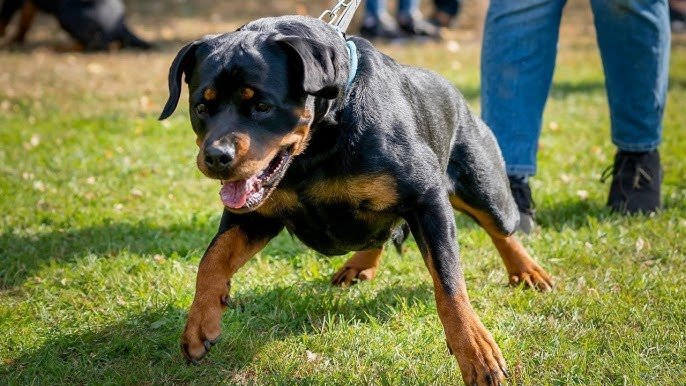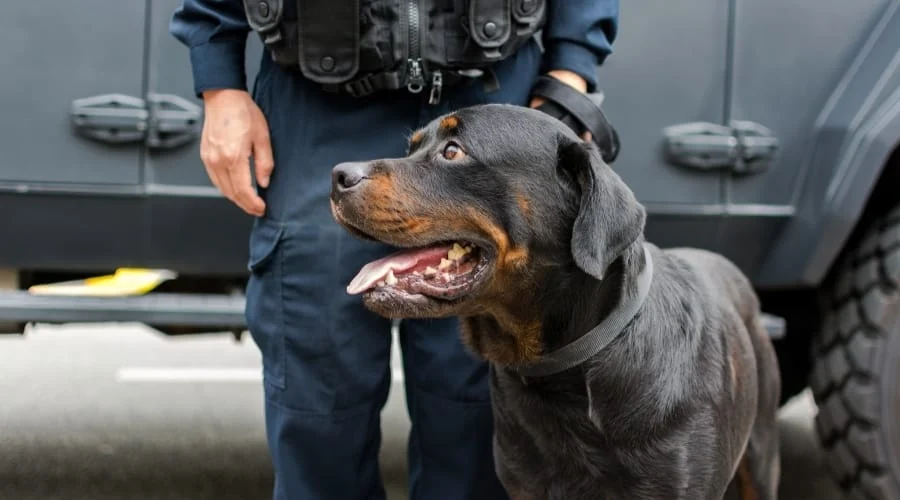How to Handle Aggression in Rottweilers
Rottweilers are strong, protective dogs that have historically been used as guard dogs and working companions. While they are known for their loyalty and intelligence, like all dogs, Rottweilers can exhibit aggressive behavior if not properly trained, socialized, or treated with respect. Understanding the root causes of aggression and implementing responsible ownership practices are key to managing and preventing such behavior. Here’s how to handle aggression in Rottweilers and ensure they remain well-mannered and balanced companions.
1. Early Socialization is Crucial
Socialization is one of the most important steps in raising a well-behaved Rottweiler. From a young age, Rottweilers should be exposed to a variety of people, environments, animals, and situations to prevent fear-based aggression. When a Rottweiler isn’t properly socialized, they may become overly protective or anxious in unfamiliar situations, which can lead to aggression.
Introduce your Rottweiler to other dogs, animals, and a variety of human interactions at a pace they are comfortable with. Positive experiences with different people and animals will help reduce the likelihood of aggressive reactions. Regular socialization builds confidence and teaches them that new people and environments are not threats.
2. Positive Reinforcement Training
Training is essential to prevent aggression in Rottweilers. Use positive reinforcement methods such as rewarding good behavior with treats, praise, or toys. Reward-based training helps reinforce desirable behaviors while building a strong bond between you and your dog. Avoid punishment-based methods, as they can lead to fear, anxiety, and more aggression.
Teach basic commands such as “sit,” “stay,” “come,” and “leave it.” Training helps establish boundaries and ensures that your Rottweiler understands that they should only act aggressively when absolutely necessary (e.g., protecting the home from an intruder). Basic obedience training also provides mental stimulation and strengthens your dog’s ability to follow commands, which is crucial for managing their behavior.
3. Understand the Root Causes of Aggression
Understanding why your Rottweiler may be showing aggression is key to addressing the behavior. Aggression can be triggered by several factors, including fear, territoriality, lack of proper socialization, or even medical issues. Aggressive behavior may include growling, snapping, biting, or lunging at people, other dogs, or animals.
If your Rottweiler is displaying aggression towards other animals or humans, carefully observe the circumstances. Is the dog acting out of fear, frustration, or territorial instincts? A professional trainer or behaviorist can help you identify and address these triggers. If aggression is due to pain or medical conditions, a visit to the vet is necessary to rule out health issues.
4. Be Consistent with Discipline and Boundaries
Rottweilers are intelligent dogs that thrive on consistency. Establish clear rules and boundaries from the start and stick to them. If your Rottweiler is allowed to act aggressively in certain situations or environments, it can reinforce the behavior. For example, if they’re allowed to guard their food or toys aggressively, it can become a habitual response.
Set consistent rules about what is acceptable behavior, whether it’s indoors or outdoors. For example, make sure your dog knows that jumping up on people or barking excessively is not tolerated. Consistency in your responses helps your Rottweiler understand what’s expected of them and provides structure, which is essential for reducing aggressive tendencies.

5. Proper Exercise to Prevent Aggression
A tired dog is a well-behaved dog. Rottweilers are active, high-energy dogs that require daily exercise to stay physically and mentally stimulated. Without enough physical activity, they can become frustrated, anxious, and may direct their energy toward aggressive behavior.
Ensure that your Rottweiler gets adequate exercise through daily walks, playtime, running, or mental challenges. A long walk or run can help burn off excess energy, while interactive games like fetch or tug-of-war provide mental stimulation. Regular exercise also helps reduce stress and anxiety, two common causes of aggression.
6. Avoid Aggressive Situations
If you notice that your Rottweiler is becoming aggressive in specific situations, such as during car rides, with unfamiliar people, or in crowded spaces, avoid putting them in those situations until they are better trained and socialized. Taking gradual steps to expose them to these environments, with controlled and positive reinforcement, will help reduce anxiety and fear-based aggression.
If you’re introducing your Rottweiler to new people or pets, do so in a calm, controlled environment. Use a leash and avoid any situations where your dog could feel cornered or threatened. Always keep interactions positive and rewarding, and give your dog plenty of space to adjust at their own pace.
7. Seek Professional Help When Needed
If you find that your Rottweiler’s aggression is persistent or worsening, or if you’re unsure of how to handle the situation, seeking professional help is the best course of action. A professional dog trainer or behaviorist can assess the behavior and recommend a customized training plan. They may also teach you how to handle specific triggers and reactions more effectively.
In some cases, aggression may be linked to anxiety or stress, which a trainer can help address with specific behavior modification techniques. If your Rottweiler is showing signs of aggression that could pose a danger to others, it’s essential to work with a professional to correct the behavior as soon as possible.
8. Ensure Proper Health Care
Sometimes, aggression in dogs can be linked to health problems. If your Rottweiler has suddenly become aggressive without any apparent triggers, it could be due to pain, illness, or discomfort. Joint issues, ear infections, or even dental problems can cause a dog to react aggressively out of pain.
Regular vet check-ups are essential to ensure your Rottweiler is in good health and to address any underlying medical issues that may contribute to aggressive behavior. If your Rottweiler’s aggression coincides with any signs of illness or injury, seek veterinary care promptly.
Conclusion
Managing aggression in Rottweilers requires understanding, patience, and commitment to proper training. Early socialization, positive reinforcement, clear boundaries, regular exercise, and professional help when needed are all essential elements of responsible ownership. By addressing the root causes of aggression and being proactive in your dog’s training, you can ensure that your Rottweiler remains a loyal, well-adjusted companion that is safe to be around. Remember that a Rottweiler’s aggressive behavior is often a response to their environment or experiences, and with the right approach, it can be managed effectively.








